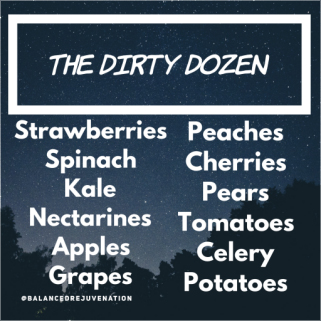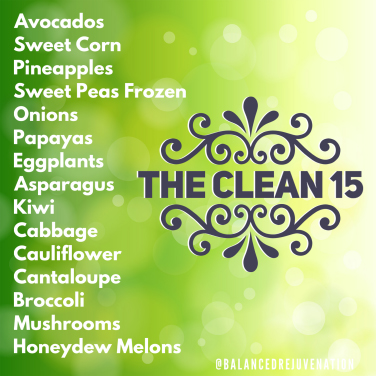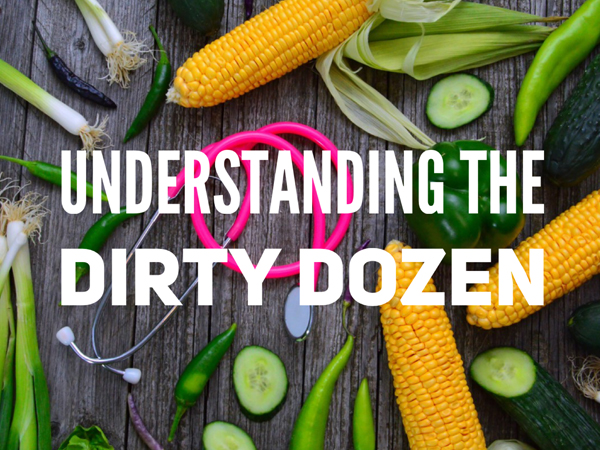Author: Carley Siedlecki, @theheartracer
Personally, I used to make fun of organic produce. Why would I buy organic strawberries for 2 or 3 dollars more than the regular ones?? But in the past decade or so, it has become more apparent how organic foods are beneficial for our health, especially when it comes to avoiding toxins. After seeing the Dirty Dozen come up on my newsfeed over and over again, I decided to look into it in more detail.
What is the Dirty Dozen?
 The dirty dozen is a list of 12 foods that are known to have the most pesticide contamination due to how they are grown. It was created by the Environmental Working Group (EWG), which is an American activist, non-profit group that specifically questions the health and safety of our produce by investigating toxins used in agriculture as well as in drinking water. Every year, they put out this list of foods to avoid, and the list is determined through their research.1 Basically, this is a list of produce that the EWG highly recommends you buy organic to avoid those high levels of toxins that can be detrimental to your health over time.
The dirty dozen is a list of 12 foods that are known to have the most pesticide contamination due to how they are grown. It was created by the Environmental Working Group (EWG), which is an American activist, non-profit group that specifically questions the health and safety of our produce by investigating toxins used in agriculture as well as in drinking water. Every year, they put out this list of foods to avoid, and the list is determined through their research.1 Basically, this is a list of produce that the EWG highly recommends you buy organic to avoid those high levels of toxins that can be detrimental to your health over time.
What are those pesticides?
Pesticides and persistent organic pollutants (POPs) can build up in your body and can contribute to health issues over time.2
You can find information on the specific toxins found in each of the Dirty Dozen foods on this link right here. Several pesticides, industrial chemicals and by-products that have adverse effects on humans. You can find more information on these pesticides through this link here, from the Stockholm Convention on POPs, an international treaty that emphasizes how to restrict the production and use of pollutants in our foods and environment.3
What does this mean for you when you’re grocery shopping?
If you can, try to get these 12 foods in the organic section of your grocery store. This does not mean you should avoid Kale or any of the dirty dozen foods if you can’t find organic. It just means that you should try to buy the organic versions if possible.
 Don’t forget the Clean 15!
Don’t forget the Clean 15!
The EWG also made of list of the foods with the least amount of pesticide residue. No dire need to buy these in the organic section if you are concerned about toxins.
Something to Consider
The EWG works to protect communities from pollutants in foods and drinking water, and it often raises points of interest with and against The Environmental Protection Agency (EPA), feeling that the government can do more to protect public health. The EWG is a nonprofit, and it advocates for public health in our community. The EPA is a government agency that also works hard to protect the people. If you are interested in researching more about recent articles on POPs, both the EWG and EPA websites are great to look into.
In conclusion…
The Dirty Dozen and Clean 15 lists are useful in helping you avoid foods with high levels of toxins. You don’t need to avoid the Dirty Dozen foods, but be mindful of the types of organic and nonorganic foods you are eating.
The best way to get more information
Contact Balanced Rejuvenation if you have any questions! You can leave a comment or find us at http://balancedrejuvenationmed.com/ Find us on facebook as or Instagram at @balancedrejuvenation
References
1 Environmental Working Group. (n.d.). EWG’s 2019 Shopper’s Guide to Pesticides in Produce™. Retrieved March 25, 2019, from https://www.ewg.org/foodnews/summary.php
2 Gilden, R. C., Huffling, K., & Sattler, B. (2010). Pesticides and Health Risks. Journal of Obstetric, Gynecologic & Neonatal Nursing,39(1), 103-110. doi:10.1111/j.1552-6909.2009.01092.x
3 Convention, S. (n.d.). The 12 initial POPs under the Stockholm Convention. Retrieved April 2, 2019, from http://chm.pops.int/TheConvention/ThePOPs/The12InitialPOPs/tabid/296/Default.aspx

